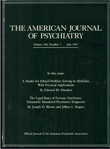This is a challenging time to be putting together a review of psychiatry, but Howard Goldman and his colleagues have constructed a very informative textbook designed especially for medical students. The book is divided into four sections (Theory and Concepts, Psychiatric Assessment, Mental Disorders, and Treatment Modalities) and contains 41 chapters. The individual chapters are quite authoritative on balance, although some variation is inevitable in a collection by multiple authors.
A framework for the book is the biopsychosocial model, popularized by Engel, and most of the authors appear to accept the model, if only tacitly in some instances. The model itself is not critiqued, but perhaps it should be—not to discredit it but somehow to get beyond the lip service we usually pay to it. There can be little disagreement with the concept behind the model; namely, that most clinical phenomena in psychiatry (if not in all of medicine) represent complex, interlocking patterns of biological, psychological, and social processes. The model by itself does not stimulate much controversy. In my experience, however, interesting differences of opinion emerge when timing and sequencing of interactions in the three domains are addressed. I believe that medical students should be aware of these issues because they come up every day in the office, on rounds, and in treatment planning.
There are some truly outstanding chapters in this collection. “The Psychiatric Interview” by David E. Reiser manages to provide a structure for the student to hold on to while emphasizing empathy, respect, and trust as core values for the field of psychiatry. “Substance-Related Disorders: Alcohol and Drugs” by H. Westley Clark and co-authors is a comprehensive yet practical overview of this increasingly important area, which is inching ever closer to the core knowledge base of psychiatry. (Some day we may not have to use the term “dual diagnosis.”) “Delusional and Other Psychotic Disorders” by Edward L. Merrin is a thoughtful treatment of a group of conditions that has received insufficient attention, given the fact that such disorders represent an important and legitimate public concern. “Consultation Psychiatry in the General Hospital” by Richard J. Goldberg and Craig Van Dyke is a pithy review that reflects the experience and expertise of the authors.
There are two ingredients that I would have wanted to find in this otherwise excellent review. Since the intended audience is primarily medical students, I would have liked to see an initial statement somehow conveying the excitement and promise of psychiatry. It remains a distinct privilege to work in psychiatry, and no other field offers such a grand humanistic scientific vista for young physicians to survey and to ponder. Second, I believe that a chapter discussing psychiatry in the age of managed care would be timely, and I hope it would convey psychiatrists' fundamental belief that no matter what administrative structures mushroom around us, the human problems we are trained to treat are with us yet and there will be challenging work to do in the foreseeable future. These comments are essentially footnotes to an otherwise strong and positive endorsement for the Review of General Psychiatry.

